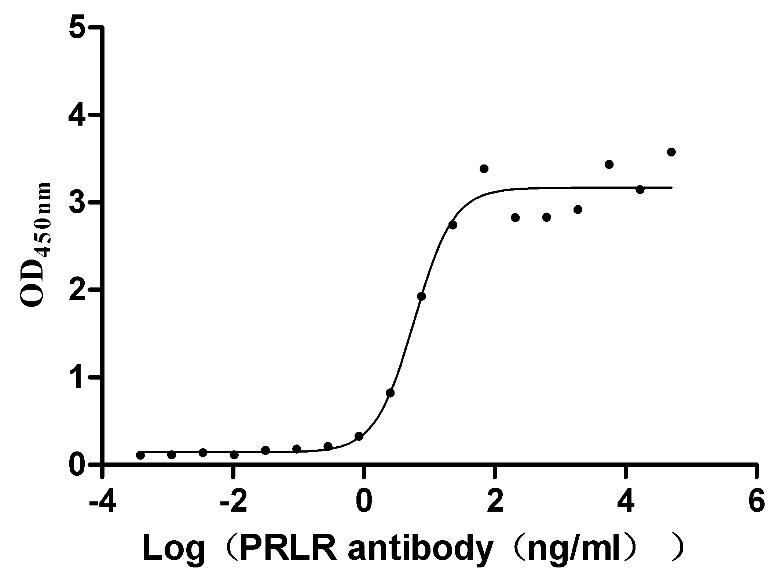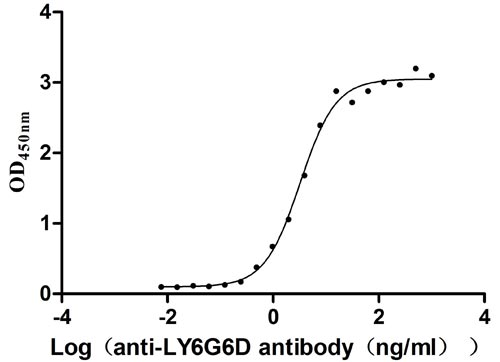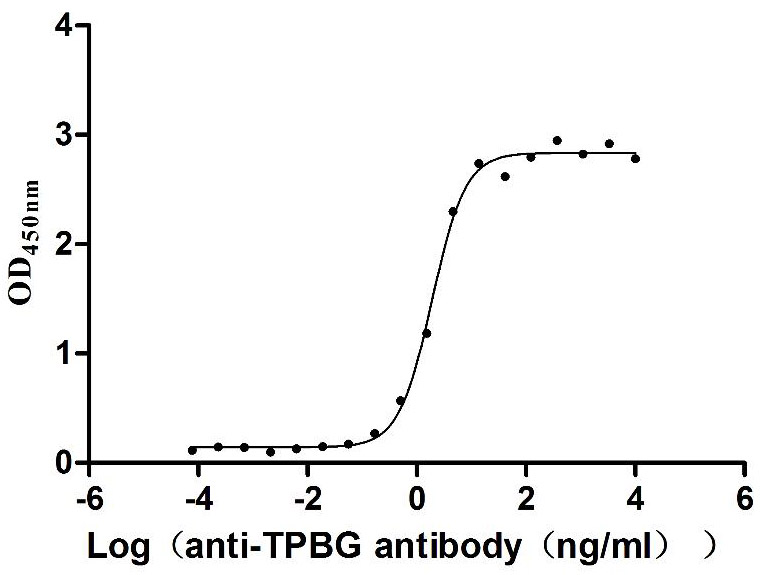Recombinant Human Myelin-oligodendrocyte glycoprotein (MOG), partial
-
中文名稱:人MOG重組蛋白
-
貨號:CSB-EP619083HU
-
規(guī)格:¥1344
-
圖片:
-
其他:
產(chǎn)品詳情
-
純度:Greater than 85% as determined by SDS-PAGE.
-
基因名:
-
Uniprot No.:
-
別名:BTN6; BTNL11; MGC26137; MOG alpha 5; MOG alpha 6; MOG AluA; MOG AluB; MOG; MOG Ig AluB; MOG_HUMAN; MOGIG2; Myelin oligodendrocyte glycoprotein; Myelin-oligodendrocyte glycoprotein; NRCLP7
-
種屬:Homo sapiens (Human)
-
蛋白長度:Partial
-
來源:E.coli
-
分子量:17.9 kDa
-
表達(dá)區(qū)域:30-154aa
-
氨基酸序列GQFRVIGPRHPIRALVGDEVELPCRISPGKNATGMEVGWYRPPFSRVVHLYRNGKDQDGDQAPEYRGRTELLKDAIGEGKVTLRIRNVRFSDEGGFTCFFRDHSYQEEAAMELKVEDPFYWVSPG
Note: The complete sequence including tag sequence, target protein sequence and linker sequence could be provided upon request. -
蛋白標(biāo)簽:N-terminal 10xHis-tagged
-
產(chǎn)品提供形式:Liquid or Lyophilized powder
Note: We will preferentially ship the format that we have in stock, however, if you have any special requirement for the format, please remark your requirement when placing the order, we will prepare according to your demand. -
緩沖液:Tris-based buffer,50% glycerol
-
儲存條件:Store at -20°C/-80°C upon receipt, aliquoting is necessary for mutiple use. Avoid repeated freeze-thaw cycles.
-
保質(zhì)期:The shelf life is related to many factors, storage state, buffer ingredients, storage temperature and the stability of the protein itself.
Generally, the shelf life of liquid form is 6 months at -20°C/-80°C. The shelf life of lyophilized form is 12 months at -20°C/-80°C. -
貨期:Basically, we can dispatch the products out in 1-3 working days after receiving your orders. Delivery time may differ from different purchasing way or location, please kindly consult your local distributors for specific delivery time.Note: All of our proteins are default shipped with normal blue ice packs, if you request to ship with dry ice, please communicate with us in advance and extra fees will be charged.
-
注意事項:Repeated freezing and thawing is not recommended. Store working aliquots at 4°C for up to one week.
-
Datasheet & COA:Please contact us to get it.
相關(guān)產(chǎn)品
靶點詳情
-
功能:Mediates homophilic cell-cell adhesion. Minor component of the myelin sheath. May be involved in completion and/or maintenance of the myelin sheath and in cell-cell communication.; (Microbial infection) Acts as a receptor for rubella virus.
-
基因功能參考文獻(xiàn):
- Anti-MOG positive patients may have manifestations that mimic neuromyelitis optica spectrum disorders but differ in their course and prognosis from anti-AQP4 positive NMOSD. PMID: 26498263
- Molecular Dynamics (MD) simulations were used to explore the interactions of MOG35-55 at the receptor level. PMID: 27388119
- Adoptive transfer of serum from anti-MOG Ab mice or of purified anti-MOG Ab 8.18C5 into naive 2D2 recipients triggered activation and expansion of T cells followed by severe and robust experimental autoimmune encephalomyelitis, suggesting that the mechanism of anti-MOG Ab-mediated opsonization of auto-antigen may indeed contribute to initiation and propagation of CNS demyelinating disease. PMID: 27022743
- Retinal nerve fiber layer may be better preserved in MOG-IgG versus AQP4-IgG optic neuritis. PMID: 28125740
- Data show that aquaporin-4 (AQP4) and myelin-oligodendrocyte glycoprotein (MOG) autoantibodies double positive neuromyelitis optica spectrum disorder (NMOSD) patients had a multiphase disease course with a high annual relapse rate. PMID: 26920678
- MOG antibody associated optic neuritis tends to involve the anterior optic pathway. PMID: 26163068
- This study demonstrated that increased expression of mRNA of OLIG1 in ventral prefrontal white matter in major depressive disorder. PMID: 25930075
- In patients with idiopathic optic neuritis, 27.6% (8/29) were positive for MOG antibodies. Three of the eight MOG-positive patients showed significantly high CSF levels of myelin basic protein. Five had optic pain and three had prodromal infection. PMID: 25838512
- Immune modulation by a tolerogenic myelin oligodendrocyte glycoprotein (MOG)10-60 containing fusion protein in the marmoset experimental autoimmune encephalomyelitis model. PMID: 25393803
- These data demonstrate a new role for myelin glycosylation in the control of immune homeostasis in the healthy human brain through the MOG-DC-SIGN homeostatic regulatory axis, which is comprised by inflammatory insults that affect glycosylation. PMID: 24935259
- findings suggest that immune reactions toward MOG and in particular MOG-specific antibodies may play a functional role in multiple sclerosis PMID: 22494461
- Patients with neuromyelitis optica spectrum disorders with MOG antibodies have distinct clinical features, fewer attacks, and better recovery than patients with AQP4 antibodies or patients seronegative for both antibodies. PMID: 24415568
- Bipolar I disorder and schizophrenia share a number of common genetic risk loci and susceptibility genes including the genes coding for myelin oligodendrocytes glycoprotein (MOG). PMID: 23032943
- We could show for the first time that a subset of aquaporin 4-IgG seronegative patients with neuromyelitis optica exhibit a MOG-IgG mediated immune response PMID: 22204662
- This study provides valuable information about requirements of anti-myelin oligodendrocyte glycoprotein reactivity for being regarded as a prognostic biomarker in a subtype of MS. PMID: 22093619
- The authors found that the human myelin oligodendrocyte glycoprotein (MOG) specifically bound to the E1 envelope glycoprotein of rubella virus, and an antibody against MOG could block rubella virus infection. PMID: 21880773
- A missense mutation in myelin oligodendrocyte glycoprotein as a cause of familial narcolepsy with cataplexy. PMID: 21907016
- The persistence or disappearance of antibodies to MOG may have prognostic relevance for acute childhood demyelination PMID: 21795651
- Conformational structure of the MOG-derived peptide 101-108 in solution. PMID: 20549678
- A mutated MOG peptide [MOG97-109] enables detection of MOG97-109-reactive T cells in multiple sclerosis patients bearing the HLA-DRB1*0401 allele. PMID: 21653833
- Report provides evidence that the humoral immune response against MOG in children is specific for demyelinating inflammatory CNS disorders. PMID: 21177754
- Persistence of MOG antibodies despite viral clearance in a high percentage of HIV-1 associated neurocognitive disorder (HAND) patients suggests ongoing neuroinflammation, possibly preventing recovery from HAND. PMID: 21083890
- cell surface-expressed native myelin oligodendrocyte glycoprotein nor linear epitopes have a predictive or discriminative role during the preclinical disease phase for developing clinically isolated syndrome or multiple sclerosis later in life PMID: 20685767
- The results of this study have observed that changes in splicing, but not expression levels, are associated with common genetic variation in the MOG gene PMID: 20800907
- Our study provides first evidence that the MOG G511C (Val142Leu) polymorphism might be associated with structural changes in the total white matter volumes of OCD patients. PMID: 20452030
- identification of T cell epitopes that are encephalitogenic and presented by B cells PMID: 11739534
- The B cell and T cell epitopes have been identified in rat MOG-immunized marmosets, and these sequences are observed to map primarily onto accessible regions in the model, which may explain their ability to generate potent antibody responses. PMID: 11895369
- A T cell reactivity pattern analysis of multiple sclerosis patients at the onset of relapse or progression shows that there is a highly immunogenic epitope for CD4+ T cells within the transmembrane/intracellular part of MOG comprising amino acids 146-154. PMID: 12077287
- MOG-specific antibody is critical to the initiation of MOG-induced murine experimental autoimmune encephalomyelitis PMID: 12115610
- polymorphisms do not provide evidence to support a significant role for MOG in multiple sclerosis susceptibility. PMID: 12149493
- a substantial proportion of MOG-reactive T cells from some subjects have been activated in vivo without resulting in clinical disease PMID: 12482392
- Human MOG is immunogenic and induces experimental autoimmune encephalomyelitis in C57BL/6 mice via an encephalitogenic B cell response to epitopes on human MOG protein that most likely cross-react with mouse determinants. PMID: 12817031
- Demonstration of molecular mimicry between MOG and butyrophilin suggests that exposure to this common dietary antigen may influence the composition and function of the MOG-specific autoimmune repertoire during the course of multiple sclerosis. PMID: 14688379
- No significant evidence for biased transmission of alleles at the (CA)n (chi2=2.430, 6 df, P=0.876) (TAAA)n (chi2=3.550, 5 df, P=0.616), C1334T (chi2=0.040, 1 df, P=0.841) and C10991T (chi2=0.154,polymorphisms in patients with schizophrenia was seen. PMID: 15660663
- In human brain the splice variants of MOG appear at a late stage compared to the major isoform, coincidental with myelination and myelin maturation, unlike other myelin proteins. PMID: 16903876
- pathogenic antibody response to native MOG in a subgroup of multiple sclerosis patients PMID: 17142321
- This study represents the first evidence of alternative translation products from the MOG gene. To date, it is believed that alternative splicing of MOG is limited to primates. PMID: 17402967
- results indicate that variation within the MOG gene is not an important independent determinant of multiple sclerosis -inherited risk in the Sardinian population PMID: 17509152
- MOG may be a target of Hoxd1 PMID: 17554625
- Our findings highlight myelin oligodendrocyte glycoprotein splicing as a factor that could be critical to the phenotypic expression of multiple sclerosis. PMID: 17573820
- The associations observed in Japanese and French patients, the linkage studies and the present work speak in favor of the existence of a susceptibility gene for autism in the NF1 locus. PMID: 17897745
- A sequence variation in the MOG gene is involved in multiple sclerosis susceptibility in Italy. PMID: 17928868
- although individuals with anti-myelin oligodendrocyte glycoprotein (MOG) antibodies have an increased risk of developing multiple sclerosis, this association may at least in part reflect cross-reactivity between MOG and Epstein-Barr nuclear antigen PMID: 18753473
- genetic polymorphism is associated with autism in Sardinian children PMID: 19167444
- B cell autoimmunity to this MOG is therefore most common in patients with a very early onset of MS PMID: 19687098
顯示更多
收起更多
-
相關(guān)疾病:Narcolepsy 7 (NRCLP7)
-
亞細(xì)胞定位:[Isoform 1]: Cell membrane; Multi-pass membrane protein.; [Isoform 5]: Cell membrane; Multi-pass membrane protein.; [Isoform 2]: Cell membrane; Single-pass type I membrane protein.; [Isoform 3]: Cell membrane; Single-pass type I membrane protein.; [Isoform 4]: Cell membrane; Single-pass type I membrane protein.; [Isoform 6]: Cell membrane; Single-pass type I membrane protein.; [Isoform 7]: Cell membrane; Single-pass type I membrane protein.; [Isoform 8]: Cell membrane; Single-pass type I membrane protein.; [Isoform 9]: Cell membrane; Single-pass type I membrane protein.
-
蛋白家族:Immunoglobulin superfamily, BTN/MOG family
-
組織特異性:Found exclusively in the CNS, where it is localized on the surface of myelin and oligodendrocyte cytoplasmic membranes.
-
數(shù)據(jù)庫鏈接:
Most popular with customers
-
Recombinant Mouse Prolactin receptor (Prlr), partial (Active)
Express system: Mammalian cell
Species: Mus musculus (Mouse)
-
Recombinant Human IL12B&IL12A Heterodimer Protein (Active)
Express system: Mammalian cell
Species: Homo sapiens (Human)
-
Recombinant Human Lymphocyte antigen 6 complex locus protein G6d (LY6G6D) (Active)
Express system: Yeast
Species: Homo sapiens (Human)
-
Recombinant Macaca fascicularis Trophoblast glycoprotein (TPBG), partial (Active)
Express system: Mammalian cell
Species: Macaca fascicularis (Crab-eating macaque) (Cynomolgus monkey)
-
Recombinant Human Tumor-associated calcium signal transducer 2 (TACSTD2), partial (Active)
Express system: Mammalian cell
Species: Homo sapiens (Human)
-
Recombinant Human Cell adhesion molecule 1 (CADM1), partial (Active)
Express system: Mammalian cell
Species: Homo sapiens (Human)
-
Recombinant Human Cadherin-17 (CDH17), partial (Active)
Express system: Mammalian cell
Species: Homo sapiens (Human)
-
Recombinant Mouse Cytotoxic and regulatory T-cell molecule (Crtam), partial (Active)
Express system: Mammalian cell
Species: Mus musculus (Mouse)





















